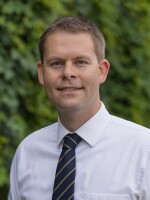Justin Sperry learned about the emergence of COVID-19 like everyone else — on the news. In late January 2020, he was at a conference where scientists wondered whether the virus would make its way to the United States.
Just two months later, Sperry’s supervisors at Pfizer announced it would be all hands on deck. His team would be a key part of the race to develop a vaccine.
“It was quite amazing,” said Sperry, the head of research and development at Pfizer’s Chesterfield site, where he is also a vice president for technology and innovation for biotherapeutics and vaccines. “When we did have that final [all hands on deck] message to colleagues, we had a lot of hands raised in the site saying, ‘We absolutely want to contribute to this.’”
Pfizer’s Chesterfield site — about 500 employees in total — has played a critical role in developing and manufacturing a key component of the Pfizer COVID-19 vaccine. As Sperry described it, it was a monthslong enterprise, filled with 4 a.m. phone calls, collaboration with colleagues across the globe and a series of major breakthroughs.
“There was information constantly being generated [in Europe] that would feed our activities here in the U.S. And then we would feed information back to them so they would be prepared for the next day, and oftentimes, they were staying up very late to get this information,” Sperry said. “It was really quite an undertaking, and there was so much discretionary energy involved with colleagues, and we really were empowered to make decisions very quickly. We kind of erased our titles and our group names, and we really truly came together as a team.”
The Pfizer-BioNTech COVID-19 vaccine is an mRNA vaccine. And, while the Centers for Disease Control and Prevention bills it as a new type of vaccine to protect against infectious diseases, Sperry said the science that supports mRNA vaccines is 60 years old.
He described DNA as the cookbook, with mRNA like a recipe card that shares its instructions.
“You're not going to rip the page out of your cookbook. You're going to copy it, you're going to put it on a recipe card, at least in the olden days,” Sperry explained.
Each mRNA vaccine starts with a DNA template. The one used in Pfizer vaccines is manufactured in Chesterfield.
“We were dedicated to making the world's supply of this DNA template and to date, we've generated enough template to make over 3 billion doses. It's all happening in Chesterfield,” Sperry said. “For literally every dose of the vaccine that's been distributed around the world — we've distributed 1.3 billion doses to date, and we're distributing to 120 different countries today — every single DNA template came from Chesterfield.”
After the templates are used to build the vaccine at a different location, each dose makes its way back to Chesterfield for rigorous tests before being released to the U.S. government for distribution.
Describing his work on St. Louis on the Air, Sperry acknowledged the pride he takes in it.
“I'm also a husband, a father, a son. And these shots are not only going into us, they're going into my daughter, my wife, my mom, my grandma, my family, our friends, our neighbors,” he said. “It’s absolutely critically important that every single step, every single raw material, every single dial and knob in the process was well-studied, well-controlled and completely validated for the Emergency Use Authorization.”
Sperry is optimistic that the Pfizer-BioNTech vaccine will be granted that authorization in October or November for kids 5 to 11 years old. He said the company hopes to have safety and immunogenicity data by the end of the month and a summary of the data presented shortly thereafter to the Food and Drug Administration. In June, trials began for kids as young as 6 months old.
Sperry is seemingly not discouraged by the 80 million Americans who haven’t been vaccinated, despite a plentiful supply.
“Ultimately, I feel like everybody needs to come and ask the right questions for themselves,” Sperry said. “I think we're encouraged so far. If you look at those that are eligible to get vaccinated, those that are 12 and older, the U.S. is actually at 60% vaccinated, and that's a big improvement.”
In Missouri, he noted, vaccination numbers continue to rise, however slowly.
“We have 54% of the state that’s received their first dose, which means that we hope that they also sign up for their second dose. I ultimately think that every single person is kind of evaluating their risk to this disease,” he said. “Some people have a very high risk. Some people have a very low risk. But collectively, vaccines are a really key proactive tool to get ahead of this virus.
“The more people that we have vaccinated, we can collectively, as a whole, bring that risk down for everyone. So we're seeing positive trends and we hope that people continue to build their own confidence in the science. The science is very, very sound. We're going to continue to educate and be transparent about the process and the vaccine.”
Sperry will deliver a keynote speech tomorrow morning as part of the annual Hancock Symposium at Westminster College in Fulton, Missouri. Sperry’s presentation offers “Past, Present, and Future Insights into the COVID-19 Vaccine.”
Related Event
What: Hancock Symposium
When: Tuesday through Thursday
Where: Westminster College in Fulton, Missouri, and online
“St. Louis on the Air” brings you the stories of St. Louis and the people who live, work and create in our region. The show is hosted by Sarah Fenske and produced by Alex Heuer, Emily Woodbury, Evie Hemphill and Lara Hamdan. The audio engineer is Aaron Doerr.






